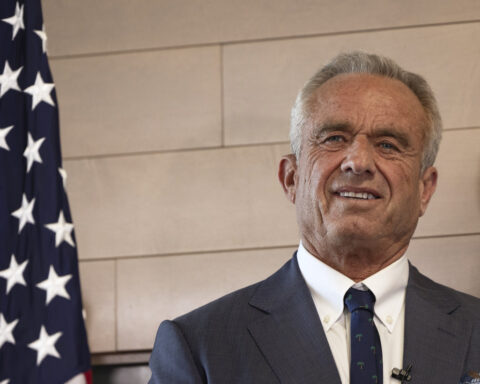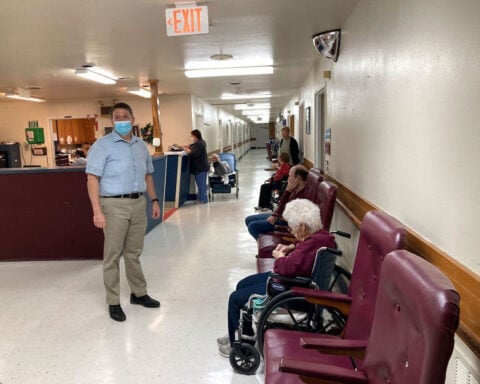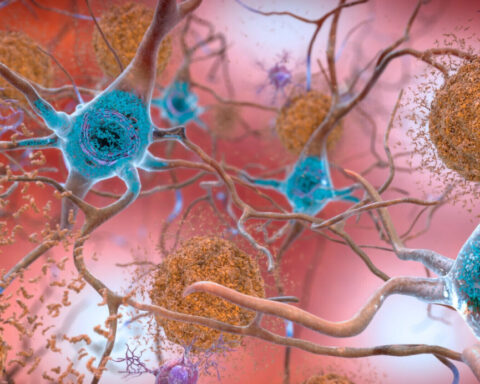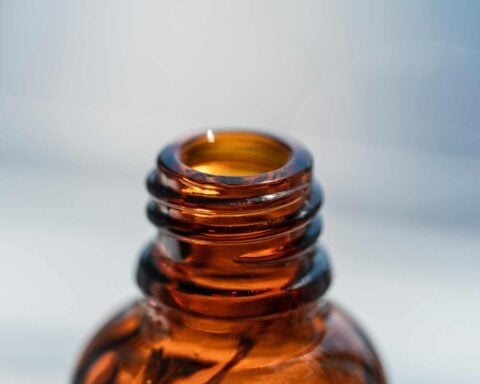Editor’s note: The podcast Chasing Life With Dr. Sanjay Gupta explores the medical science behind some of life’s mysteries big and small. You can listen to episodes here.
(CNN) — “Stress is bad for your health” is one message we consistently hear.
And it’s true: stress can be detrimental, and lead to a whole host of ills, especially when it becomes chronic, unrelenting.
But, it turns out, certain types of stress can lead to growth opportunities and, according to one doctor and author of the new book, “The Stress Paradox: Why You Need Stress to Live Longer, Healthier, and Happier,” the right amount of it may actually be crucial to our wellbeing.
“Yes, too much stress harms us, but not enough is actually just as harmful,” Dr. Sharon Bergquist told CNN Chief Medical Correspondent Dr. Sanjay Gupta recently, on his podcast Chasing Life.
Bergquist, an assistant professor at Emory University School of Medicine in Atlanta, and the founder and director of Emory Lifestyle Medicine & Wellness, knows a thing or two about stress. As a child, she lived through the Iranian Revolution and ultimately her family was forced to flee.
“We were the last plane to leave before (Iranian leader Ruhollah) Khomeini came,” she recalled. “The airport was incredibly packed. I remember the whole process of trying to get through security and just the mass of people that were there and how we got onto the runway — every step of it.”
Her family fled to England, and eventually they settled in the United States. But life wasn’t exactly stress-free in the West either. “In eighth grade I could not write a paragraph in English without a lot of struggle. It would take me all night,” she said. Yet she managed to prosper, graduate as her high school’s valedictorian, attend Yale University as an undergraduate and then Harvard Medical School.
Bergquist’s childhood experiences planted the seeds for her interest in stress. “Ultimately it triggered this obsession for me of, why is it that some people grow and thrive from these experiences? And others don’t?” she said. She said she became really interested in the question of whether all stress is harmful.
According to Bergquist’s research, it turns out that it depends on the type and amount of stress a person’s exposed to.
“I work with a lot of professionals (who) are very driven, but are also so passionate about what they do,” she said, noting that they lead what can be considered “stressful” lives. She counts herself among them.
“I call that good stress, which I think has a very different effect on our bodies than the harmful stress that has become almost synonymous with what people describe as ‘stress’” she said. “I think I can now say with a comfortable level, that (the good) type of stress releases a biochemical profile that is actually health promoting: we release, for example, dopamine, serotonin, oxytocin.”
The dopamine is from the reward for doing something meaningful, she explained. The serotonin is from the joy that comes from accomplishment and the oxytocin is from contributing to the greater good.
She said “bad” stress is unpredictable, unavoidable, and not brief or intermittent but rather chronic. Our biochemical response to that type of stress is to release cortisol which eventually leads to the harmful downstream effects on our bodies, such as high blood pressure.
That trifecta of chemicals released when we take on good stress “mitigates our cortisol level. It literally builds our resilience to stress,” she said.
Resilience is like a muscle: It is dynamic and needs to be challenged to get stronger.
“The key, really, is that our stress responses are there to help us. They’re there to help us adapt to our world,” she said, noting that for the entirety of human history that is how humans have survived and thrived.
“But the things that help us activate those stress responses have been removed from the fabric of our lives,” she said. No longer do we have to face environmental stressors such as food scarcity and exposure to extremes of heat and cold.
“The introduction of a lot of these comforts has removed our connection with the natural environment that we live in,” she said. Consequently “we are essentially handicapping ourselves because we are not allowing our bodies to do what they are so capable of doing.”
What can you do to introduce good stress into your life? Bergquist has five tips.
Search out the Goldilocks zone
“Challenge yourself to go outside your comfort zone without feeling overwhelmed,” said Bergquist via email.
“Good stress is medicine. And like any medicine, the dose determines the response,” she explained. “Growth from stress happens when stress is in a hormetic, or Goldilocks, zone — a just right amount that’s not too much or too little.”
In other words, push yourself to get in the water and swim, but don’t let yourself drown.
Tune into self-integrity
“Are you challenging yourself in ways that align with your beliefs? Or conflict with them?” Bergquist asked.
“Your heart and mind know the difference,” she said. “Persevering in situations where you feel stuck or disconnected from your values can become a harmful form of stress.”
“Good stress is not about simply positively reframing the stress in our lives,” she said. “But instead, deliberately taking action with meaningful and purpose-driven challenges as an antidote to the chronic stressors that we can’t control or avoid.”
For example, she said, it could involve accepting or creating a job opportunity that aligns with your values or learning a skill that you find rewarding.
Be strategic about recovery
“To grow from stress, you have to make time for rest and recovery,” Bergquist said.
“Under stress, your body switches into a mode where you conserve energy and do internal housekeeping,” she said. “When you recover, your brain and body remodel and build new connections that better prepare you for future challenges.”
Recovery, Bergquist said, is just as important as good stress to gain benefits. “Even good stress can build up to becoming harmful without recovery.”
Lean into the connection between your mind and body
“Physically stressing yourself can help build mental resilience and vice versa,” Bergquist said. “It’s a remarkable process called cross-adaptation.
“When you experience good physical or psychological stress, you repair and regenerate your cells, which makes every part of your body healthier and stronger,” she explained.
You can build mental resilience, for example, by physically stressing yourself (in a good way) by doing things like “eating plant-based foods with stress resistance-building phytochemicals, exercising vigorously, briefly exposing yourself to heat and cold, and fasting intermittently through time-restricted eating,” she said. “We have many tools for managing stress and lessening its harm.”
Trust that you were made for some stress
Experiencing stress is not a glitch— it’s a feature. “Our human history is one of overcoming stress — and becoming stronger because of it,” Bergquist said.
“Through repeat cycles of stress and recovery, we summon our natural capability. It’s a gift we have inherited in our DNA,” she said. “Resilience is a muscle we can all build no matter where we are or what we are facing. It’s okay to have fears. And it’s okay to want to avoid challenges.
“Trust and do it anyway. The result can be life-changing,” she said.
We hope these five tips help you use stress to your advantage. Listen to the full episode here. And join us next week on the Chasing Life podcast when we discuss an often-forgotten domain of health as we age: mobility.
The-CNN-Wire
™ & © 2025 Cable News Network, Inc., a Warner Bros. Discovery Company. All rights reserved.

 Trump has begun another trade war. Here's a timeline of how we got here
Trump has begun another trade war. Here's a timeline of how we got here
 Canada's leader laments lost friendship with US in town that sheltered stranded Americans after 9/11
Canada's leader laments lost friendship with US in town that sheltered stranded Americans after 9/11
 Chinese EV giant BYD's fourth-quarter profit leaps 73%
Chinese EV giant BYD's fourth-quarter profit leaps 73%
 You're an American in another land? Prepare to talk about the why and how of Trump 2.0
You're an American in another land? Prepare to talk about the why and how of Trump 2.0
 Chalk talk: Star power, top teams and No. 5 seeds headline the women's March Madness Sweet 16
Chalk talk: Star power, top teams and No. 5 seeds headline the women's March Madness Sweet 16
 Purdue returns to Sweet 16 with 76-62 win over McNeese in March Madness
Purdue returns to Sweet 16 with 76-62 win over McNeese in March Madness








